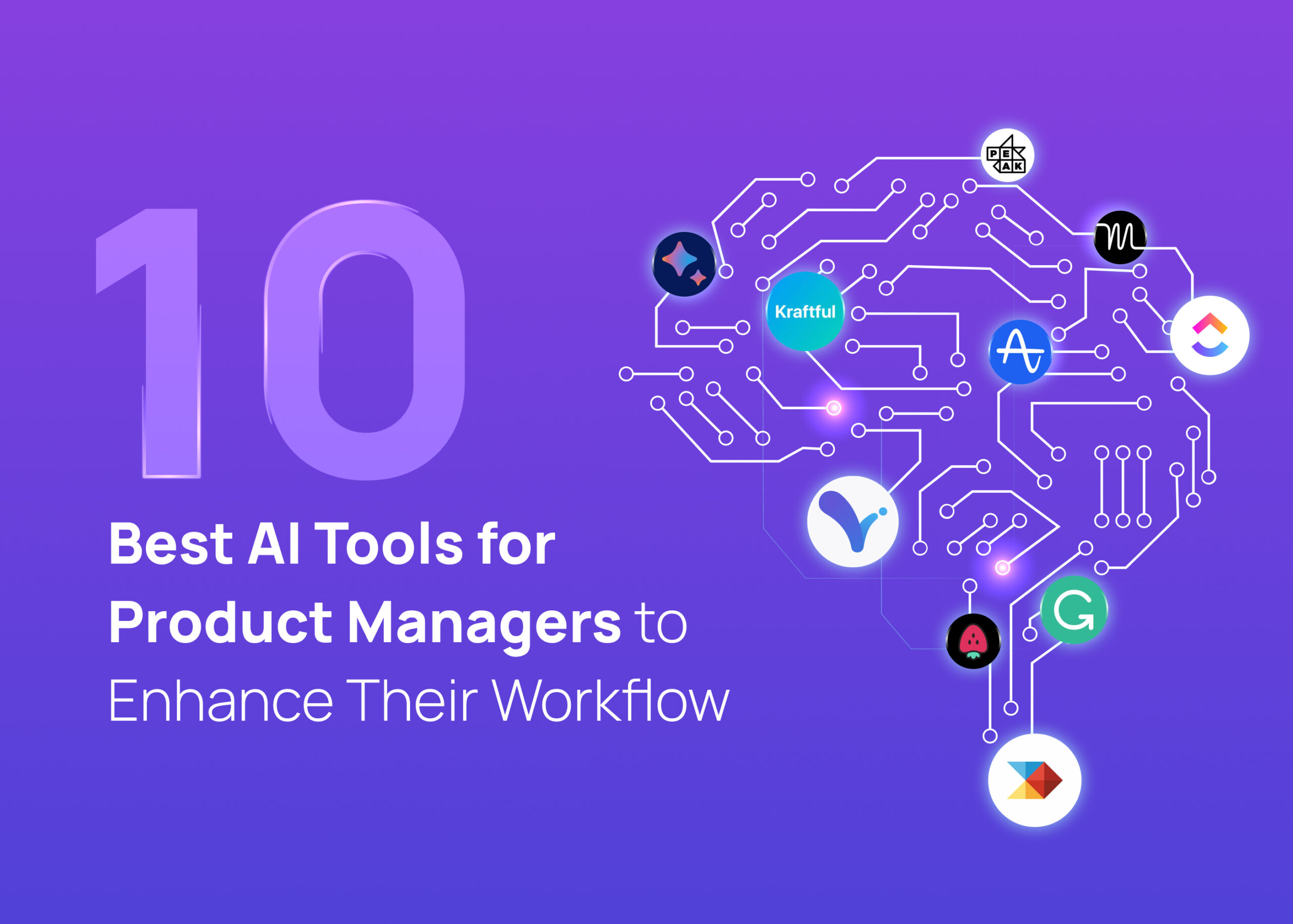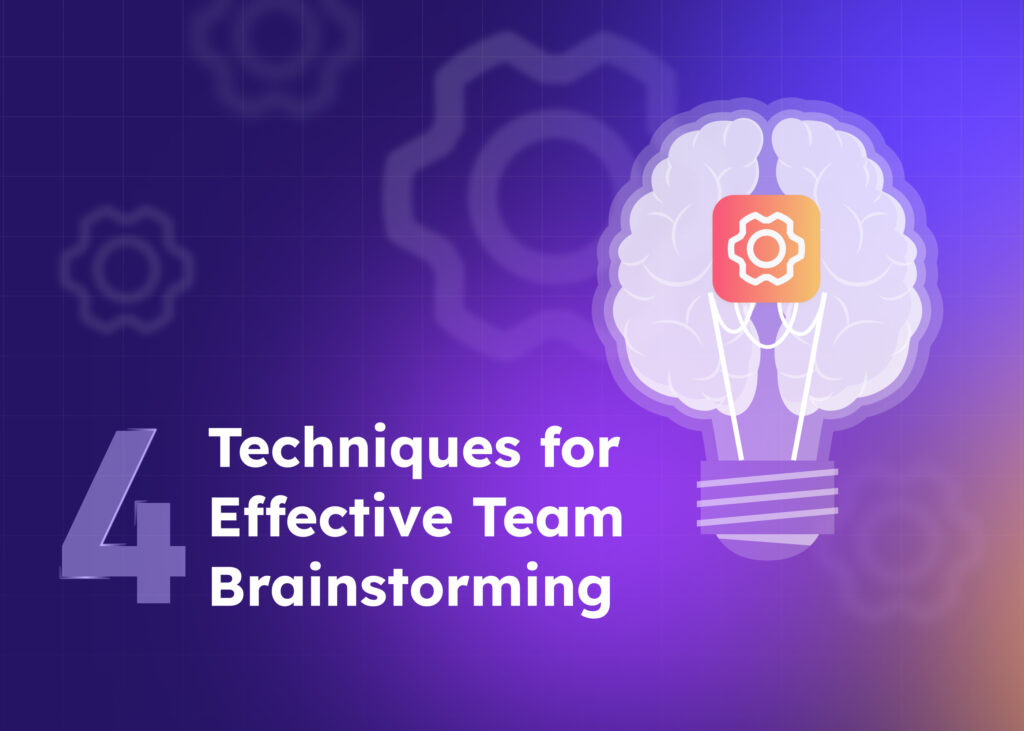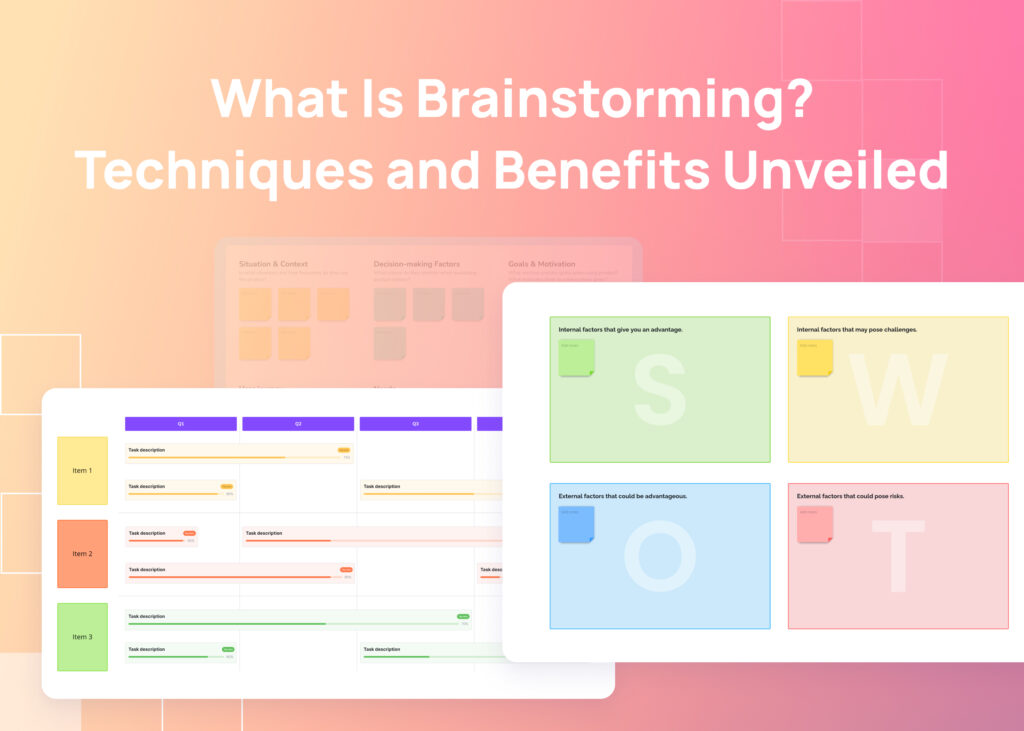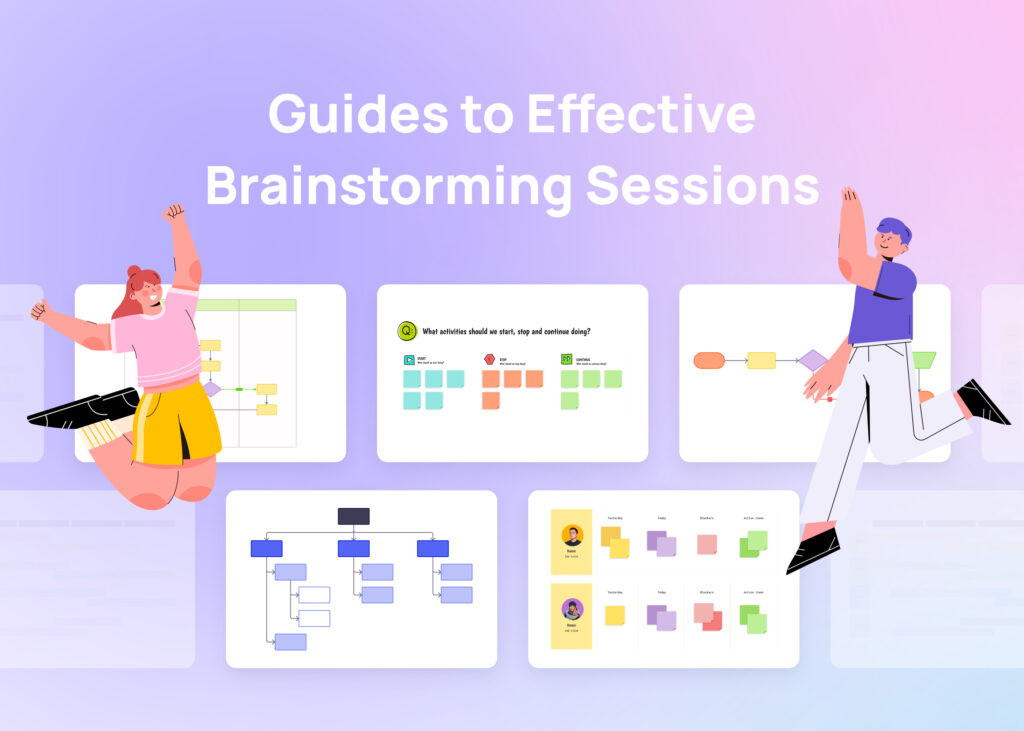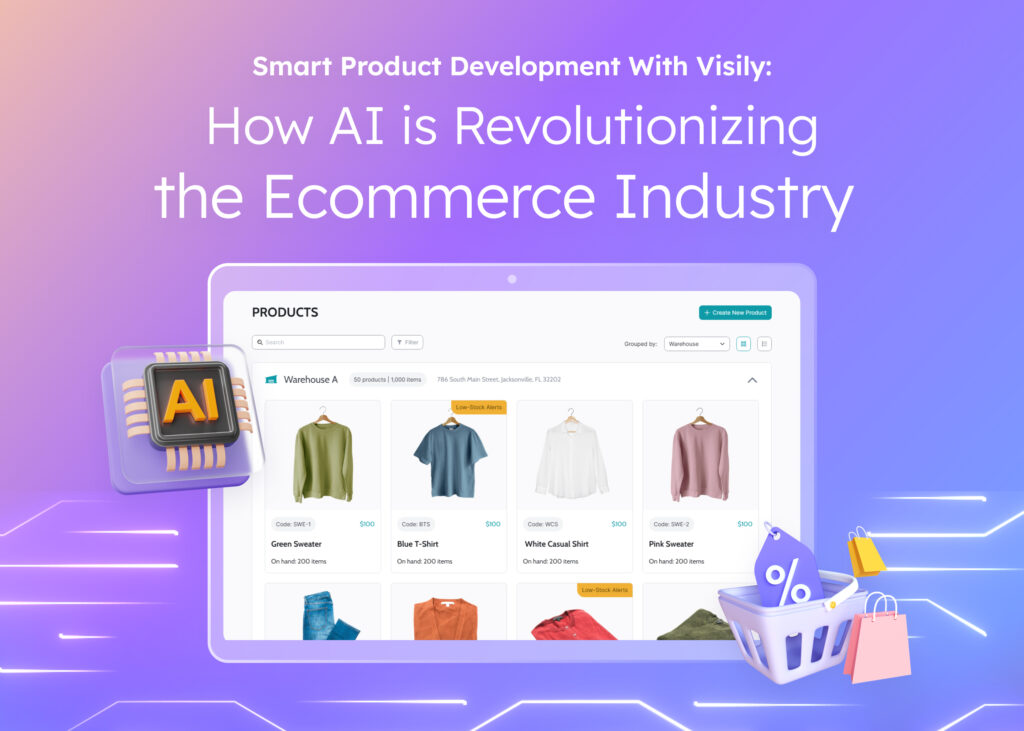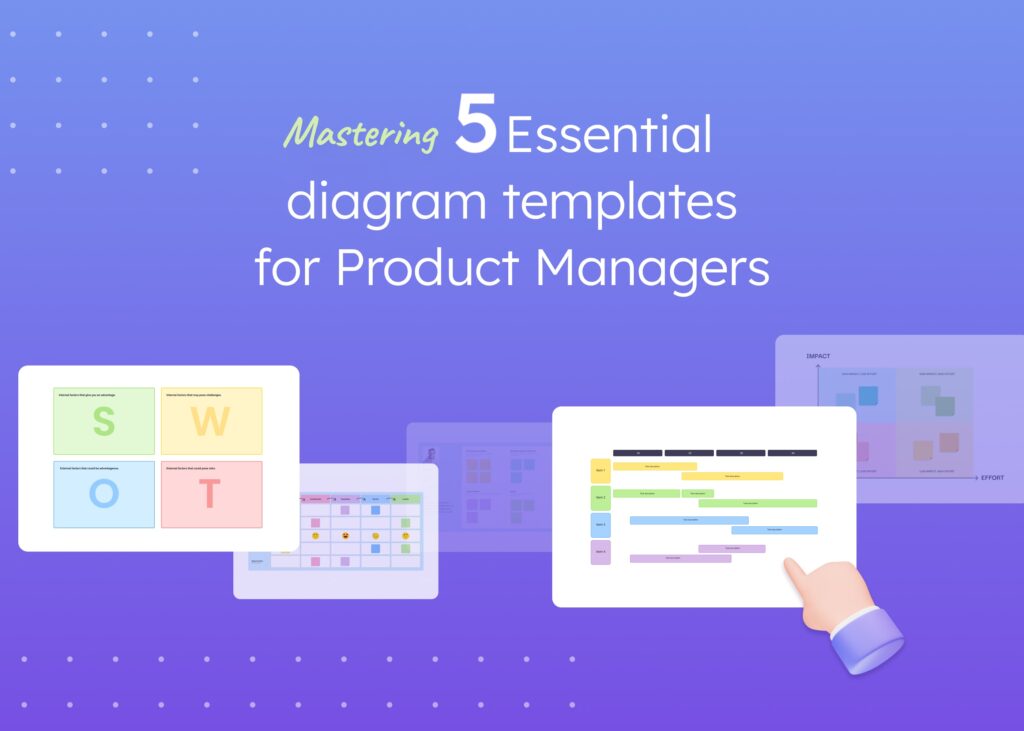A new trend in product development stems from using AI tech to simplify the workflow for product management.
In fact, product managers are one of the main groups of people who use AI in their workflows. A study by IBM showed that 21% of product managers use AI every day as a part of their product development process.
The benefits of AI and machine learning are that product managers and development teams can use them to fuel growth and gain a competitive advantage.
This article will shed light on the best AI tools for product managers, what the benefits are, how to look for good tools, and much more.
What is an AI tool?
AI (artificial intelligence) is the emulation of human intellect through algorithms programmed in software that aim to help humans perform specific tasks. One of AI’s best qualities is its ability to think and make choices that’ll probably lead to a good result.
Machine learning (ML) is a type of AI that helps computer programs learn and adjust to new information without human intervention. Using ML, AI programs can absorb large amounts of unstructured data, such as text, images, or video, so that they can automatically learn things on their own.
AI systems can do things that humans can do, like understand speech, play games, and create websites or app layouts.
AI technology helps across a wide range of fields, including design, healthcare, finance, marketing, and education, to automate processes, analyze information, and improve decision-making.
Types of AI tools for product managers
Before we dive into the types of AI tools that product managers can use, let’s quickly clear the air about a common misconception.
AI is split into two types: weak and strong. Weak AI is made to do one specific task. Examples of weak AI are Amazon’s Alexa and Apple’s Siri.
Strong AIs like Visily are created to do things that humans usually do. They use complicated programming and can handle situations where they need to solve problems without humans helping them.
AI design assistant ✍
AI design assistants help to simplify the design workflow process by creating designs (in minutes) and helping them to edit these designs, wireflows, or prototypes. They’re made to work alongside human designers, giving them the help they need to perform tasks quicker than they could do on their own.

Simply put, product managers can create designs in minutes so that they can get quick feedback on their designs, find ways to improve them, and try out different options easily. This saves time and results in more user-friendly and visually appealing digital products.
AI product management tools 👨🏻💻
An AI product management tool is software that helps product managers manage and improve the development of products.
They help in defining and refining the product strategy, conducting market research, managing backlogs and planning the product roadmap.
AI product analytics 📈
These tools go beyond traditional analytics by leveraging advanced machine learning algorithms to extract valuable insights from the data generated from products.
At its core, AI product analytic tools systematically collect, interpret, and analyze user data related to the usage and performance of products. A few key applications of AI product analytics are customer behavior, user feedback, and predictive user behavior analysis. This is like looking into a crystal ball and seeing the future needs and behavior of your users (which is priceless for any product manager).
AI project management tools 📊
Integrating AI into project management brings numerous benefits. Its capacity to observe, evaluate, and predict intricate scenarios in real time makes it an invaluable tool.
Task automation with AI surpasses what traditional methods can achieve, providing decision-makers and stakeholders with prompt and valuable insights for faster action.
AI scheduling assistant 🗓️
AI scheduling assistants use natural language processing (NLP) and ML algorithms to analyze user behavior and preferences to provide intelligent scheduling recommendations.
Using AI, these assistants examine the user’s calendar availability, daily routines, weekly responsibilities, and other factors to recommend the most suitable meeting or task times.
AI chat tool (aka customer support tools) 💬
AI chatbots are an asset to any website or app. They can help to solve simple requests from customers or to guide them if they need help. If you are building a website or an app, these can help you respond to customers faster, which will improve your overall customer satisfaction.
AI writing tool 📝
AI writing tools can help with the production of content. While they might not be great for long-form content or well-written pieces, they can help summarize key points from user behavior or feedback.
AI debugging tools 🚀
AI debugging tools greatly help product managers and website creators find and solve various bugs on websites or apps. This can greatly simplify the whole process of bug testing and save a ton of time.
How to choose an AI tool for product management?
Next, let’s go over what you should look for in AI tools for product managers.
User-friendliness
Look for tools that are easy to use. The last thing you want to do (especially with an AI tool that should simplify things) is spend hours trying to understand it. The less time your team spends deciphering the tool, the more time they can dedicate to what really matters – managing products.
Other than that, it should be easy to set up and start to use. Intuitive design is your ally here. If your team can’t figure it out without a manual thicker than a novel, it’s probably not the friendliest option.
Focus on integrations
You need your AI tools to play well with your current software stack (or future one). Make sure the integrations facilitate a constant and reliable exchange of information so your product management remains Agile.
For example, make sure it plays well with your project management, communication, email, and analytics tools.
Look for true AI features
True AI doesn’t just sound smart—it delivers.
Look for features that go beyond basic automation. True AI understands patterns, learns from data, and evolves with your needs. Don’t settle for a tool that slaps the “AI” label—go for substance.
Helpful guides or videos
Consider the tool’s learning curve—you want a gentle slope, not a vertical climb. The tools should also have lots of helpful videos or articles to help you get the most out of it or in case you get stuck. You don’t want to spend hours Googling or waiting for customer service to get back to you.
Check out customer feedback
As product managers, you probably already know the value of real reviews and feedback. Use the current feedback to get a glimpse into what you can expect from the tools.
Try it out (free trial)
Lastly, use tools that offer you some form of free trial before you commit to a long-term subscription. This way, if you don’t like something or if it doesn’t have what you need, then you can simply opt out before you spend your dollars.
10 Best AI tools for product development
Now, let’s dig into the juicy bit of this whole piece—the 10 best tools for product managers. Each one of these is uniquely different and can help with a different area of the full product development process.
1. Visily.ai – Best for product design and team collaboration
What makes Visily such a valuable tool for product managers? Mainly the fact that it has many unique AI features that can help (ANYONE) design a product or app in under 30 minutes. For a product manager, this means that you don’t have to spend hours trying to create designs just so that they can show off your ideas.
To top it off, you can beat the blank canvas effect with Visily’s AI. Have an idea for a pet shop product? Not sure where to start? The AI can turn hand-drawn sketches into full-blown designs, meaning you can simply draw what you envision and bring it to life. You can also use the screenshot to-design feature, which means you can use snapshots from a site or sites you admire.
What makes it even better is that it seamlessly flows from design function to wireflow and prototype, so there is no need to hop between design apps like Figma for the design and then over to Whimsical for the wireframe. Having to switch between these two is a bit of a pain for most product managers because you’ll probably be doing this for various iterations. Visily helps you to do this all in one app.
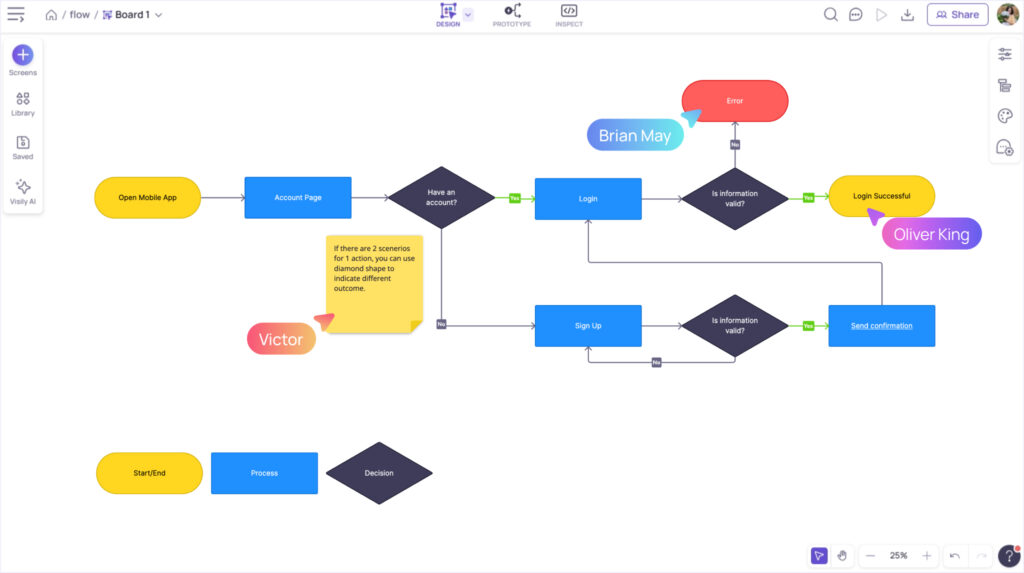
How Visily can aid product managers:
- Design from any source of inspiration in just a few minutes.
- Find similar pictures in seconds using “Magic Images”.
- Create a theme in 4 simple ways on the go using our “Magic Themes”.
- Quickly fill your designs with content and formats of your choice with “Structured Data Fill”.
- Create wireframes for websites or apps using smart components and easily toggle between low-fidelity to high-fidelity.
- Map your wireflows and brainstorm them with your team.
- Build full-blow prototypes that you can share with your team or clients.
2.a. Zeda.io – Best for user feedback and analytics
Zeda.io is an AI-powered tool for product managers. It aids product managers in converting customer feedback from multiple sources into key insights. It gives an in-depth view into customer sentiments, identifies reasons for churn and lost deals and identifies the revenue implication of each feedback. In this way, PMs can make customer-centric decisions while staying focused on company objectives.

How Zeda.io can aid product managers:
- Product managers can now quickly sift through loads of feedback with the help of AI, gaining deeper insights into key customer pain points.
- It aids you in deciding what to build next through analysis using frameworks like R.I.C.E, Value-effort, and also by considering revenue implications.
- It can help you in strategic planning by staying aligned with customer needs and business objectives.
- It helps you close the feedback loop by updating customers through AI-generated release notes.
2.b. Amplitude – Best for product insights
In order to succeed in the competitive field of product management, it’s essential to use data analytics. Amplitude, an AI-driven tool, has been leading the way in incorporating AI technology well before the hype surrounding it in 2022.
Amplitude’s AI-based set of tools provides product managers with the necessary resources to effectively navigate the data landscape, converting unprocessed data to help PMs gain valuable insights and empowering them to make data-driven decisions.
Ways Amplitude can aid product managers:
- Creating new products requires a lot of testing. Amplitude Experiment makes this process easier by simplifying tasks like coming up with ideas, designing experiments, creating different versions, making changes, and evaluating results. This helps Product Managers effectively test and improve product features for continuous enhancement.
- Amplitude’s Data Assistant helps to analyze and confirm data, ensuring that product decisions are based on trustworthy data analysis.
- Product managers have a hard time turning business questions into useful information. But with Ask Amplitude, you can ask complex questions and get data-based answers. This tool makes it easier to get helpful insights from data, saving you time and effort.
3. ClickUp – Best AI project management tool
ClickUp helps product managers work more efficiently by automating tasks, improving communication, and encouraging creativity. It can help product managers with the intricate process of developing and overseeing products. This includes creating product roadmaps, launching features, and using templates for product improvement.
How ClickUp can aid product managers:
- Looking for ideas to enhance your product’s content strategy? Use ClickUp’s AI to produce unique concepts by analyzing current and future trends, industry knowledge, and user preferences, assisting you in creating compelling content.
- Choosing names for features and functions is important for product management. ClickUp AI can suggest good names for features, making it easier to make decisions.
- ClickUp can help create surveys specific to your product’s requirements, making user feedback gathering crucial and efficient in obtaining valuable insights.
4. Motion – Best AI-powered scheduling assistant
Motion, a top-notch AI productivity tool, can simplify your life by handling the intricate and often time-consuming task of scheduling.
If one of your tasks ends up taking longer than expected or an unexpected situation arises, Motion will rearrange the other tasks according to your availability and preferences in the most optimal manner.
In essence, it can take the place of various other applications you might currently be using, such as calendars, task management tools, to-do lists, appointment schedulers, and even concentration aids.
How Motion can assist product managers:
- Auto-schedule tasks and meetings. Even integrates with email and Slack to schedule tasks and meetings from chats or emails. If you rearrange your team’s tasks, it’ll automatically optimize everyone’s schedules to compensate.
- Kanban board view with AI assistant. With Motion’s Kanban board, you can easily oversee all the tasks and happenings within your team. The AI will also alert you if it foresees any delays in a team member’s workflow.
- AI time-blocking feature to help you make the most of your time for deep work.
5. ProductBoard – Best customer feedback platform
Product managers have a tough job. They need to understand what customers want, prioritize important product features, and get everyone on the same page about the product. ProductBoard is a great tool that helps with all of these tasks. It helps with gathering customer feedback, data-driven decision-making, and communicating the product’s vision.
Ways ProductBoard can help product managers:
- ProductBoard and Frame.ai’s partnership is a big deal for CX leaders. It uses AI to study customer conversations and give information about their feelings, likes, and problems. This integration also organizes feedback, helping product teams focus on the most important issues and make improvements.
- ProductBoard makes it easy to gather and study feedback from users by creating different channels. This helps product teams concentrate on specific topics, like feedback about a specific feature, type of customer, or trend in the market.
- ProductBoard AI helps PMs make attractive and easy-to-understand roadmaps for their products.
6. Peak.ai – Great for boosting product pricing and inventory
Peak.ai is not just your average AI platform—it is a formidable force committed to maximizing product inventory, refining pricing strategies, and providing personalized customer experiences. While it may not attract the same attention as showy generative AI, it offers substantial benefits to companies by improving efficiencies throughout their entire value chain.
Ways Peak.ai can help product managers:
- Use Peak.ai’s pricing optimization abilities to establish ideal prices for products at every stage of their lifecycle.
- Peak.ai helps product managers create personalized omnichannel experiences, boosting customer loyalty and lifetime value.
- Peak.ai’s AI may seem “boring,” but it’s a powerful tool for improving efficiency. You can use it to make decisions faster, allocate resources better, and lower the cost of helping customers.
7. Kraftful – Best AI tool for product analytics
Kraftful is a modern platform that uses artificial intelligence to provide detailed product analytics. Its main purpose is to help product teams understand their users’ changing needs, identify areas for improvement, and create high-quality products. With advanced AI technology, Kraftful summarizes and analyzes user feedback, making product development more effective.
How Kraftful can help product managers:
- Summarize a lot of feedback to find out what users want and get quick insights.
- Communicate with user information to efficiently address significant inquiries.
- Compose comprehensive Jira tickets and meticulously crafted PRDs to share with team members.
8. Jam – Best AI debugging tool
Jam or JamGPT is designed to assist product managers in identifying and articulating problems to engineering teams. Product managers often lack technical expertise, but JamGPT bridges this gap by providing a clear understanding of the issue. This information can then be shared with the engineering teams, enabling them to enhance the product.
How Jam can help product managers:
- Get AI suggestions or quick TLDRs for most bugs that you can share with engineers or coders.
- It can auto-fix some bugs so that user experience is improved.
- Automatically record pertinent console logs and network requests.
9. Google Bard – Best for product research
Google Bard is an AI-powered conversational genius. A go-to tool for writing, answering questions, and problem-solving as a product manager.
This tool is great for making design briefs and sharing them with your team on Google Docs. It’s also helpful for brainstorming product features together. People say it’s a really creative and useful tool to work with.
Ways Bard can aid product managers:
- Bard can offer current data on industry patterns, competitor actions, and market trends.
- You can use Bard to create different types of content, like reports, documents, and project plans, quickly and easily. It saves a lot of time and makes sure everything is at the same level of quality.
- The language translation skills of Bard are useful for product managers who work with teams and customers from different countries.
10. Grammarly AI – Best for writing and checking documents
Writing various types of documents is a crucial component of your role as a product manager. To improve your writing abilities, Grammarly can serve as a valuable resource.
Grammarly is a web-based writing tool designed to identify errors in English texts, including spelling, grammar, punctuation, flow, reader engagement, and delivery. In addition, users can customize their writing style, tone, and incorporation of context-specific language. The Grammarly AI feature takes this to another level and helps to refine and generate text based on your style with pinpoint accuracy.
How Grammarly can help product managers:
The advanced Grammarly AI presents a multitude of prompts to enhance your writing, ranging from refining your text to generating a concise TL;DR of your product requirements document and elevating the tone of your release notes, among a variety of other options.
How can AI tools help product managers?
AI can speed up product innovation by doing repetitive tasks. This saves time from manual work and lets product managers focus on important things. For instance, AI-driven design tools like Visily can automate design, searching for similar images and adjusting themes, allowing product managers to concentrate on higher-value tasks.
Using AI in product management offers a major advantage in streamlining intricate decision-making procedures. AI technology can identify patterns, trends, and connections that may go unnoticed by human analysis through the use of data-driven information.
One instance of this is when ProductBoard, an AI tool, uses data analytics to support product managers in visualizing and ranking product characteristics according to customer input and market patterns.
AI tools help businesses quickly understand what customers want and how the market is changing. This way, product managers can respond quickly and stay ahead of their competition.
Generative AI can produce tailored product descriptions for a distinct group of people. AI can create personalized reports and descriptions by using information about the target audience. This can help product managers and marketing teams in crafting more appealing products for their target demographic.
Improve your product management with AI
There is a wide range of AI software tools available to product managers, which they can use to streamline their work, generate innovative ideas, and enhance their decision-making abilities. These tools are incredibly helpful and can save you valuable time, energy, and of course some stress.
Similar to the realm of AI software, the field of product management is constantly changing. To stay ahead, it’s crucial to stay informed about the most current developments and advancements. If you do this, you will be ready to make the most out of any tools in the future.
Always keep in mind the importance of staying curious, remaining open-minded, and staying caffeinated. Being a product manager is a challenging role, but AI has the potential to make it easier.
Try Visily for free.




